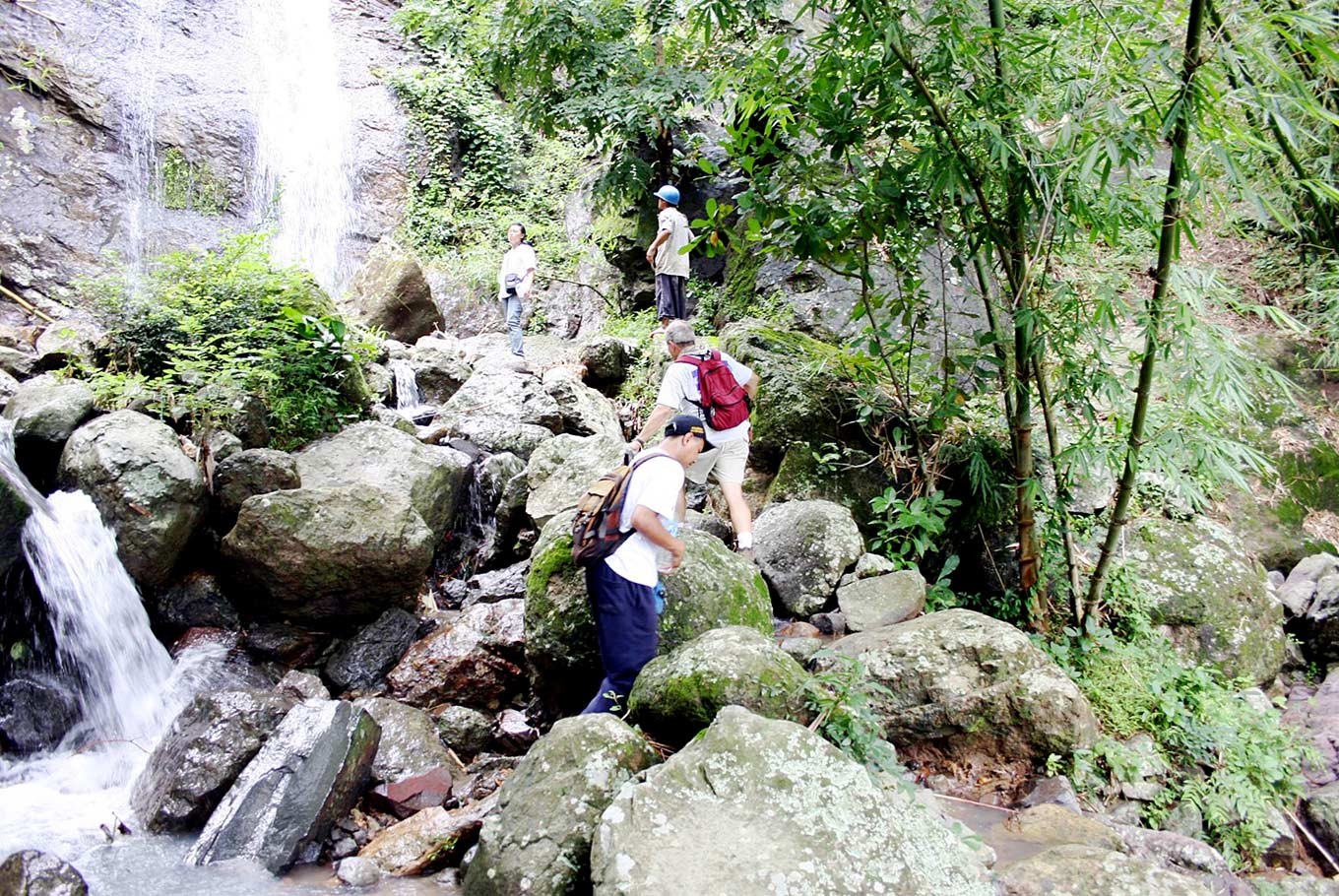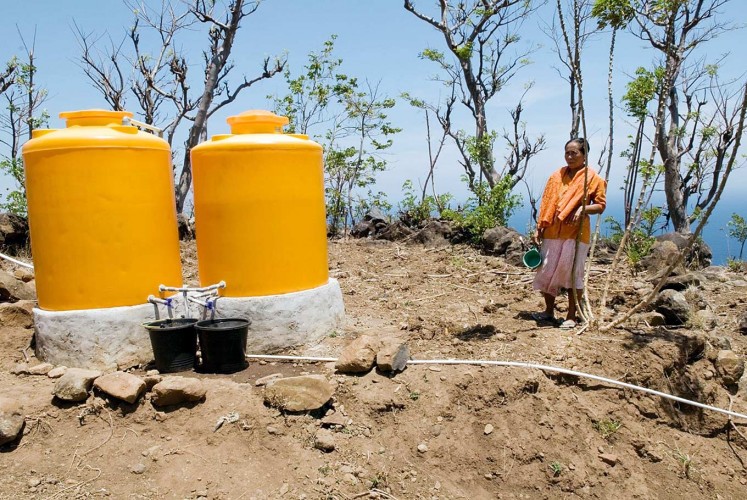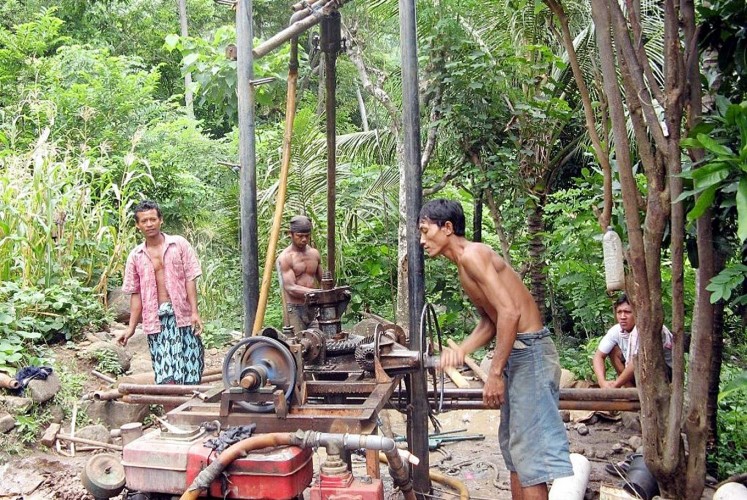Richard Foss: Deep into Bali Water Projects
Change Size
 Going up: Flash floods are a risk in the area where Richard Foss and his team work in Bali. (Richard Foss/File)
Going up: Flash floods are a risk in the area where Richard Foss and his team work in Bali. (Richard Foss/File)
I
t’s a long way and many years from the battlefields of Vietnam in the 1960s to the parched hills of east Bali. But that’s where Richard Foss finds himself today engaged in a different kind of war.
For 12 years Richard Foss has been establishing water systems in impoverished villages in east Bali, innovations that have had the power to change people’s lives.
Foss was born in South Dakota, United States and spent his youth hunting and fishing on the state’s eastern plains. He was accepted at West Point at age 17.
After graduating from the military academy in 1962 as a second lieutenant, he did two combat tours in Vietnam as the commander of a helicopter door gunner detachment, infantry company commander and strategic reconnaissance operations planner.
While in the service, Foss graduated with a master’s degree in engineering at Tulane University in New Orleans in 1973 and earned another master’s at the University of Colorado in public administration in 1986, skills that were to serve him well in the burning mountainous terrain of Karangasem district.
His last posting in the US Army was Colorado where he retired with the rank of lieutenant colonel in 1984.
Not a man content with watering his lawn and playing golf into the twilight years, from 1985 to 1990 Foss taught as an adjunct professor at the University of Colorado. At the end of his teaching career, he and his wife Danielle started traveling in Southeast Asia.
After several visits to Bali, they thought so highly of the island’s charms they ultimately moved there in 1992 and built a home in Ubud in 2008.
“Our snorkeling gear was very heavy and took a lot of room in the suitcase. We now live here about 10 months every year. We go back now only to visit our children and grandchildren,” Foss confessed.
Foss was a Rotary member in Colorado Springs, where he ran programs saluting the troops and honoring the flag.
Once settled in Bali, he sought out the Rotary Club of Ubud, which he and his wife joined in 2005. At the time of the second Bali bombing the same year, they were staying on the beach in Amed.
When the fragile tourist economy of the area was devastated by the bomb, it led to Foss’s interest in developing east Bali whose economy was particularly hard hit.

For more than a decade, facing challenges of language and a severe geography, the Fosses have worked on projects in 16 different villages that bring to the eastern region the one element that is even more fundamental to sustaining life than food: safe drinking water.
Many subsistence families had only antiquated systems of bamboo pipes and holes in the ground. People had to walk from 30 minutes to four hours to get water from springs high in the hills or from wells down by the sea.
In 2017, Foss published Bali Water Project (CV. Bayu Graphic), the story of making water available for human consumption.
Though some sections deal with health care, sanitation, education and the economic development of Bali’s rural mountain people, the book does not discuss water for bathing, agriculture or animals. A captivating part of the book touches on the Fosses’ life in Bali.
Foss is a firm believer that people must not rely simply on outside help but must also learn to solve their own problems. He believes he should only provide the means for them to do so.
Long ago he understood that water projects brought in from the outside do not work unless the local people become involved.
He learned to listen carefully to what these hard working and industrious mountain people felt comfortable with. Their resolve eventually produced an effective and efficient water system.
Water for drinking and cooking is a scarce commodity in Bali’s dry northeast where the dry season lasts from March to October.
Bringing potable water closer to the isolated communities of Karangasem is critical. Although potable water is not the answer to all their problems, it is the keystone. If villagers feel that an idea is theirs, they will do the necessary work toward a solution.
After all, it is their project and they will be doing most of the work. Economic opportunity, health and education then may be addressed.

By 2007, some 4,000 people in the region had their daily water needs available within 15 minutes of their homes. Water is stored in concrete or fiberglass storage tanks and provided to homes through kilometers of connected piping.
Rotaractors (sub-contractors hired by Rotary) and Rotarians made sure the right equipment was placed on the coastal road, then men and women laboriously carried the sand, cement, rebar, pipe and plastic tanks uphill and across ravines to the work sites.
Sustainability of a project is the result of the village taking on direct responsibility. The banjar (village council) collects a small hook-up fee from the families who will be served.
In addition, Rp 4,000 (30 US cents) per month is charged each family and held at the banjar for the purchase of fuel for the pump and maintenance of the system. People are designated by the village chief and then trained and given responsibility of routinely maintaining the system.
Foss’s work in the tiny village of Gulinten is just one shining example. The inhabitants of this remote village once had to trek for hours to collect water from a freshwater spring.
When the project was completed in 2007, water was pumped 1 kilometer up to a large concrete tank and then distributed to four tanks near 44 families (250-350 people). Each tank is strategically placed on the side of a hill to serve about 10 families. The project was funded by the Rotary Clubs of Colorado Springs, InterQuest and Bridgetown in Australia with Bali Ubud Sunset as the international host club.
The Banjar Aas Water Project is another success story. This just completed deep-well project, storage tank and hand-washing facility was funded to the tune of $13,000 by a coalition of individual philanthropists and international Rotary clubs.
The site has also become the wantilan (meeting place) for the banjar and also includes a nurse’s room where volunteer nurses stay in order to hold health fairs every month.
As is often the case with village wells in the developing world, the new sources of water also fill a vital social function. Families gather at the central tank to not only collect water, but to share news and local gossip with friends.
“Most satisfying of all,” Foss confided. “I’ve observed that when one of our village projects is completed, it motivates people to start raising cattle and chickens and begin using the water to cultivate corn, cassava and pumpkins. Clean water seems to transform people’s thinking.”









